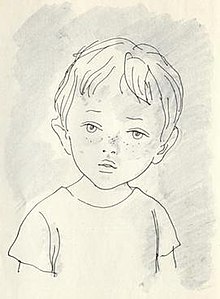Seryozha (novel)
 Frontispiece illustration to a Russian edition of Seryozha published in Leningrad in 1965 | |
| Author | Vera Panova |
|---|---|
| Language | Russian |
Publication date | 1955 |
| Publication place | Soviet Union |
Seryozha (Russian: Серёжа, published 1955) is a short novel by Soviet writer Vera Panova. Seryozha has also been translated as Time Walked and A Summer to Remember. Seryozha is a diminutive form of the name Sergey.
Plot
Seryozha is the story of a young boy living in the rural Soviet Union in the mid-1950s. The novel describes Seryozha's experiences, and those of his family, friends and neighbors over the course of a summer. The most important event of the story is the marriage of Seryozha's mother to a Red Army veteran named Dmitry Korostelyev. Korostelyev becomes the new manager of the local collective farm and a strong role model for Seryozha. Throughout the novel Panova gives a relatively grim picture of life in the rural Soviet Union where both money and opportunity are scarce. The novel ends with Korostelyev being reassigned to a new collective farm in the remote Arkhangelsky District, and taking the family with him.
Quote
Panova said of the genesis of Seryozha:
"The soul of a child was revealed to me, the revelation engendered reflection, my reflections became clothed in images- and there appeared Seryozha." [1]
English translations
- Time Walked, Harvill Press, 1957.
- A Summer to Remember, Thomas Yoseloff, 1962.
- Selected Works, Progress Publishers, Moscow, 1976.
Screen version
The story was brought to the screen in the 1960 film Seryozha by Georgi Daneliya and Igor Talankin.[2]
References
- ^ Panova, Vera (1976). Vera Panova, Selected Works. Moscow: Progress Publishers. p. 14. ISBN 0-8285-1018-0.
- ^ Horton, Andrew; Brashinsky, Michael (1992). The Zero Hour: Glasnost and Soviet Cinema in Transition. New Jersey: Princeton University Press. p. 258. ISBN 0691019207. Retrieved February 6, 2013.
